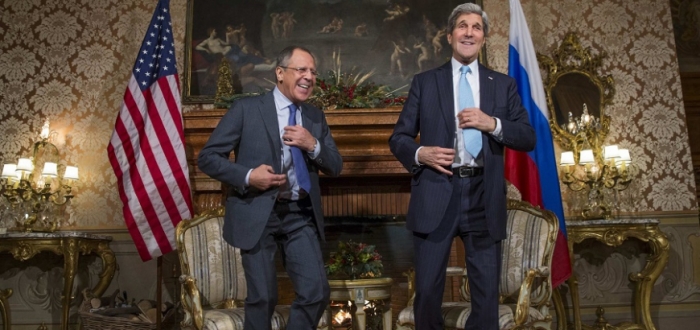While the Syrian opposition has not announced within its civilian or military capacity a final position on the deal to “cease hostile actions,” which will begin at midnight on February 27, a number of fears have beset the opposition that the deal’s implementation will feed the interests of Russia and the regime.
The first suggestions of the opposition’s doubts about the agreement came from the general coordinator for the High Negotiations Committee, Riyad Hijab, who played down his expectations that the Assad regime and its allies will comply with “the cessation of hostile actions, because they know Assad’s survival depends on continuing the campaign of oppression, killing, and forced displacement,” according to a statement.
At the top of the list of the opposition’s fears of prevarications in the deal’s implementation are phrases which require clarification, such as the exception of “terrorist organizations” in being targeted, alongside the Nusra Front and the Islamic State group. The term “terrorist organizations” raises many questions around who these groups are, and which body will decide if they are terrorists or not.
The opposition’s fears began because the Assad regime and Russia have repeatedly said that all military bodies fighting “the legitimate regime” – as they describe it – are terrorist groups which must be fought. In addition, America and Russia refuse to exclude Nusra from their strikes, including air raids. This will lead to one of two results: either “moderate” opposition factions will be struck on the excuse that they are in Nusra’s areas – or because they communicate with them, especially since the areas where Nusra is present overlap with the areas of other factions, some of which are supported by the US – or there will be a fissure and fighting between the opposition factions and Nusra, because the latter refuses to break its ties with Al-Qaeda, which is the main reason for it being targeted.
In this context, foreign relations and international law expert Wissam Eddin Akleh told Al-Souria Net that “the chance of the deal succeeding and continuing are weak due to a lack of trust that the regime will comply with the terms of the truce and will use its agents to violate it if it finds it is not in its interests, and also because of the large overlap between the fronts and the difficulty of drawing clear maps of areas controlled by factions included in the truce and those which are not, in addition to the lack of a clear mechanism to implement it and the haziness of the military and political scenarios that will result from the success or collapse of the truce.”
Maan Talaa, researcher in politics and international relations at the Omran Center for Strategic Studies in Turkey, considered the joint Russian-American communique around the deal to be a new attempt to hasten the imposition of a political solution according to a ‘Putinist vision.’ He told Al-Souria Net that “the joint communique came to compel revolutionary forces to deal with reality according to a binary: either accept a ceasefire which allows Assad to strike it under the pretext of terrorist organizations, or refuse and then be internationally classified as a terrorist force.”
He added that one of the gaps in the deal is that it promotes “conditions turning forces of the revolution into rebel groups, while at the same time the presence of the regime is legitimized by all the international decisions linked to Syria by calling its forces the ‘forces of the Syrian Arab Republic’.” He noted that the decision did not reference foreign militias supporting the regime, thereby giving them legal and political standing.
Talaa noted that one of the most prominent opposition fears is that Russia, which has rained tons of shells and rockets on the opposition, has become the shepherd of the political process and the monitor of the ceasefire. He saw the ceasefire as torpedoing that Riyadh document, which constituted the political reference for the opposition, took all the cards from it, and entered it into a political track which will not lead to real or even superficial political change.
While the deal prohibits any attempt by opposition forces to advance into regime territory, Akleh said that “the deal will be in the interest of the regime as it will secure the gains its forces have recently achieved on the ground, especially in the Aleppo countryside, and on the southern front (Daraa – Sheikh Maskin), while placing an obstacle in front of any potential Saudi-Turkish ground intervention.”
He stressed that in the framework of the American effort to implement an end to fighting, Washington will prevent weapons from getting to the Syrian opposition, which will hurt the opposition given that the boundless support for the regime from its allies Russia and Iran will not stop, giving it an opportunity to advance militarily at the first potential failure of the ceasefire.
The Opposition’s Options
Regarding the options the opposition can pursue in this framework, the researcher Talaa saw them as:
First: The High Negotiations Committee should reject the ceasefire entirely, and threaten to withdraw from the negotiating process, because of its paragraphs exempting groups and organizations geographically camouflaged within the infrastructure of the opposition, thereby requiring the Russians and Americans to give guarantees that this exception will not be made into a tool and excuse to strike the opposition.
Second: Regarding the group of allies, frankness should be demanded of them decisively about the position of support for the opposition, politically and militarily, and they should be pushed to move to firmer practices.
Third: Take advantage of the mood of popular support for the Committee and work to deepen relations between the political and military aspects of the revolution, and begin a series of measures and policies to define the core political and military strategic goals.
This article was translated and edited by The Syrian Observer. Responsibility for the information and views set out in this article lies entirely with the author.


